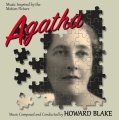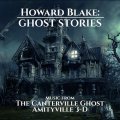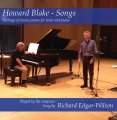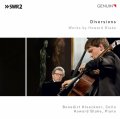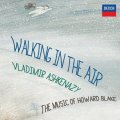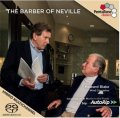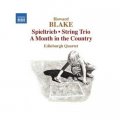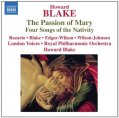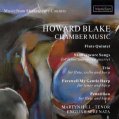 Highbridge Music Ltd.
Highbridge Music Ltd.
Studio 6, 18 Kensington Court Place, London W8 5BJ, UK
Email: howard@howardblake.com
Recordings
Details of published CD, DVD, Video and LP recordings of the works of Howard Blake.
Use the search form to filter results, search by keyword, title, artists or related opus number.
A full list of all of Howard's works which have been recorded (though not necessarily published or made available for sale) can be found here.
The Avengers - Original Tara King Season Score (CD)
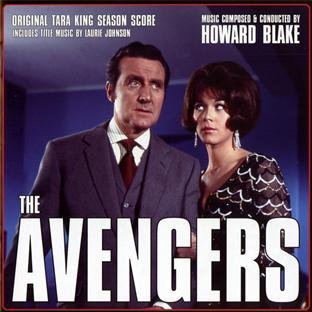 Released: 2012
Released: 2012Recorded: 1968
Artists: Archive recordings of the film scores, orchestra of ABPC Elstree, music composed and conducted by Howard Blake
Available from:
Silva Screen
Released by: Silva Screen
Selected soundtracks from 'The Avengers' conducted by Howard Blake
ack with ‘Avengers’ Howard Blake
05.04.12
Phillip Mlynar
Category: Interviews
Tags: Avengers, Music Supervision
'Avengers' Diana Rigg and Patrick MacNee. Photo: Keystone/Getty Images
The Avengers is here! Well, one incarnation of The Avengers, because long before Marvel’s super-hero-hooked movie there was the cult-British spy show The Avengers. First broadcast in Britain during the ’60s, the plots showcased thrilling espionage antics that were set to a swanky and dramatic score. But there is a connection to the spy Avengers and the Marvel Universe, or at least some influence. X-Men creation Emma Frost is rumored to have been inspired by the TV Show and the X-Men‘s own mutant series, Excalibur, showcased a villain, Emma Steed, whose name was a sly combination of two of the TV show’s main characters (Emma Peel and John Steed). Like a lot of shows from the ’60s, the score in the The Avengers was sweeping, dramatic and fueled by big-band arrangements. Just last year, a collection of the series’ best compositions surfaced on this two-CD set (available as an import only).
So with all-out Avengers fever in full effect, Hive checked in with composer Howard Blake, who scored the final season of the show, to get his expert views on how to use a big-band to conjure up excitement, the day Henry Mancini persuaded him to take an acting cameo in Victor Victoria, and just how you go about soundtracking a scene that involves someone falling 200 feet from the top of a lighthouse.
What initial ideas went through your mind when you got the job to score the show?
Terror! I was pretty young at the time and I had written a few documentary films and short films — I was a sort of all-purpose studio musician and an in-house pianist for Abbey Road at that time — so I was just getting my feet wet, really. Then suddenly I had to write the first episode and it was like the most trapeze-walking week of my life! I was a big fan of Henry Mancini’s Peter Gunn Theme music but I thought it had to carry on from what Laurie was doing. I remember when I first walked in the band was all set-up — it was the best big band you could get – and I got up for the first session in front of these very hard looks and I was ready for a very hard time! I had to write it all in a week and I just thought I’ll have to suspend all criticism – like not think whether it’s good enough – and I just have to cover paper and get it off to the copyist! I went up to Earl Street that day shaking with fear, and when I got in front of the guys they and the conductor all stood up and applauded, which was very unusual. But I thought it was going to be met with total silence! And that really started off a career for me.
What as the very first part of The Avengers score that you created?
The first episode was called “My Wildest Dream” and it’s a very good episode, very Freudian and about this psychiatrist and he’s finding people whose wildest dream is to kill their boss. It’s a pretty spooky and unpleasant thing. I remember I used a bass guitar riff [plays a spooky-but-funky riff on a keyboard], and that was the baseline. Then I brought in big-band over that.
The fight scene from “My Wildest Dream”:
http://youtu.be/DvRAFDGer_4
How important is that brassy, big-band sound when scoring a show or film?
A lot, I think. That sort of score is very much of that period and I’d say that in a way it was started by Mancini on the Peter Gunn thing. It was very unusual to use the big-band, although there was a film called I Want To Live! which was scored exclusively for big-band, and that’s the late-’50s. So that idea of using it for suspense for television came in with The Avengers. I think it gives a terrific punch! We had three trumpets, three trombones, five saxes, bass, drums, piano, and extras — I used to play organ at times. It’s a very exciting sound and when it really gets going it really makes the series sound very exciting.
What instruments are best to soundtrack a villain?
I used to use quite a bit of bass clarinet. If you want some oily, streaky character, you use bass clarinet and it immediately gives you that feeling. And muted brass, like a trumpet, that can get the same sort of effect. And always a bit of flute; I brought in a bass flute which was a new instrument then, too. I also bought the first Minimoog from Robert Moog, actually. It was kinda a surprise to everybody when I used that!
Did you get any feedback on the score from the actors?
The weird thing is, when you write the score on a TV series everyone is too busy filming the next scene. I recorded at Elm Street which is where the series was shot. I met up with Patrick Macnee [who played John Steed], who was a very charming person, but that was at the end of the whole series. He told me he really appreciated what I’d done. He actually asked if I could teach him to sing, but I told him that wasn’t really my expertise. And Linda Thorson, who was the star of the last season [as Tara King], I remember on day one she looked pretty terrific and she was just about to go and I wished her luck. I never saw her again until, I can’t believe this, last year! We had this reunion down at Chichester University last summer and I was sitting on stage and she came up and gave me a kiss. I asked her what took her so long!
Were you ever offered a cameo in the show?
Well, I later worked with Henry Mancini and he actually persuaded me to play the part of a piano player in Victor Victoria which was a big mistake!
Why was it a mistake?
I was musical director of Victor Victoria and did the big-band score in the film for Mancini so I got to know [director] Blake Edwards and Julie Andrews and Blake said, “We’ve got this one shot if you’d like to be in it. It’s a big nightclub scene, you just come and play the piano for Julie. It’ll be fun, you’ll love it.” I said, “Just one shot?” He said, “Yeah, just one shot.” What I didn’t know was I had to turn up at 6 a.m. in the morning in a white tux and they said come and sit at the piano: I sat at that piano from six in the morning until eight in the evening without a break. I got so locked they had to lift me off and take me for a massage. What they hadn’t told me, which was a joke on the part of Blake Edwards who was quite the practical joker, was it’s a 360 degree camera shot and as it goes around you they have to move all the audience and all the set and it’s quite a complicated thing. It wasn’t much fun.
What’s the trickiest sort of scene to soundtrack?
In the episode called “It’s All Done With Mirrors,” there is a scene where the crook in it is hurled from the top of a lighthouse and he falls 200 feet all the way to the bottom and down these stoney steps, which of course is not a possible thing to do. So I started with a sort of [mimics uptempo, bouncey refrain], but I was like I can’t keep doing that. So I thought I’d send up bits of it and use a xylophone, like this is not possible so I thought it would be funny and then bring it back really loud. But it’s a problem where you’re thinking you’re working with the film to make it work. That was quite a tricky thing to score.
Watch the first part of “It’s All Done With Mirrors”:
http://youtu.be/GIoXan3ZjzY
Tracks
- 1) Disk1_02 My Wildest Dream - opus 49
- 2) Disk1_06 Whoever Shot Poor George - opus 50
- 3) Disk1_07 All Done With Mirrors - opus 51
- 4) Disk1_13 Super Secret Cipher Snatch - opus 52
- 5) Disk1_19 Game - opus 53
- 6) Disk1_22 Noon Doomsday - opus 54
- 7) Disk2_01 Wish You Were Here - opus 55
- 8) Disk2_06 The Interrogators - opus 56
- 9) Disk2_10 Take Me To Your Leader - opus 57
- 10) Disk2_14 Who Was That Man I Saw You With - opus 58
Reviews
by Philip Mylnar 5/4/2012The Avengers is here! Well, one incarnation of The Avengers, because long before Marvel’s super-hero-hooked movie there was the cult-British spy show The Avengers. First broadcast in Britain during the ’60s, the plots showcased thrilling espionage antics that were set to a swanky and dramatic score. But there is a connection to the spy Avengers and the Marvel Universe, or at least some influence. X-Men creation Emma Frost is rumored to have been inspired by the TV Show and the X-Men‘s own mutant series, Excalibur, showcased a villain, Emma Steed, whose name was a sly combination of two of the TV show’s main characters (Emma Peel and John Steed). Like a lot of shows from the ’60s, the score in the The Avengers was sweeping, dramatic and fueled by big-band arrangements. Just last year, a collection of the series’ best compositions surfaced on this two-CD set (available as an import only).
So with all-out Avengers fever in full effect, Hive checked in with composer Howard Blake, who scored the final season of the show, to get his expert views on how to use a big-band to conjure up excitement, the day Henry Mancini persuaded him to take an acting cameo in Victor Victoria, and just how you go about soundtracking a scene that involves someone falling 200 feet from the top of a lighthouse.
What initial ideas went through your mind when you got the job to score the show?
Terror! I was pretty young at the time and I had written a few documentary films and short films — I was a sort of all-purpose studio musician and an in-house pianist for Abbey Road at that time — so I was just getting my feet wet, really. Then suddenly I had to write the first episode and it was like the most trapeze-walking week of my life! I was a big fan of Henry Mancini’s Peter Gunn Theme music but I thought it had to carry on from what Laurie was doing. I remember when I first walked in the band was all set-up — it was the best big band you could get – and I got up for the first session in front of these very hard looks and I was ready for a very hard time! I had to write it all in a week and I just thought I’ll have to suspend all criticism – like not think whether it’s good enough – and I just have to cover paper and get it off to the copyist! I went up to Earl Street that day shaking with fear, and when I got in front of the guys they and the conductor all stood up and applauded, which was very unusual. But I thought it was going to be met with total silence! And that really started off a career for me.
What as the very first part of The Avengers score that you created?
The first episode was called “My Wildest Dream” and it’s a very good episode, very Freudian and about this psychiatrist and he’s finding people whose wildest dream is to kill their boss. It’s a pretty spooky and unpleasant thing. I remember I used a bass guitar riff [plays a spooky-but-funky riff on a keyboard], and that was the baseline. Then I brought in big-band over that.
The fight scene from “My Wildest Dream”:
http://youtu.be/DvRAFDGer_4
How important is that brassy, big-band sound when scoring a show or film?
A lot, I think. That sort of score is very much of that period and I’d say that in a way it was started by Mancini on the Peter Gunn thing. It was very unusual to use the big-band, although there was a film called I Want To Live! which was scored exclusively for big-band, and that’s the late-’50s. So that idea of using it for suspense for television came in with The Avengers. I think it gives a terrific punch! We had three trumpets, three trombones, five saxes, bass, drums, piano, and extras — I used to play organ at times. It’s a very exciting sound and when it really gets going it really makes the series sound very exciting.
What instruments are best to soundtrack a villain?
I used to use quite a bit of bass clarinet. If you want some oily, streaky character, you use bass clarinet and it immediately gives you that feeling. And muted brass, like a trumpet, that can get the same sort of effect. And always a bit of flute; I brought in a bass flute which was a new instrument then, too. I also bought the first Minimoog from Robert Moog, actually. It was kinda a surprise to everybody when I used that!
Did you get any feedback on the score from the actors?
The weird thing is, when you write the score on a TV series everyone is too busy filming the next scene. I recorded at Elm Street which is where the series was shot. I met up with Patrick Macnee [who played John Steed], who was a very charming person, but that was at the end of the whole series. He told me he really appreciated what I’d done. He actually asked if I could teach him to sing, but I told him that wasn’t really my expertise. And Linda Thorson, who was the star of the last season [as Tara King], I remember on day one she looked pretty terrific and she was just about to go and I wished her luck. I never saw her again until, I can’t believe this, last year! We had this reunion down at Chichester University last summer and I was sitting on stage and she came up and gave me a kiss. I asked her what took her so long!
Were you ever offered a cameo in the show?
Well, I later worked with Henry Mancini and he actually persuaded me to play the part of a piano player in Victor Victoria which was a big mistake!
Why was it a mistake?
I was musical director of Victor Victoria and did the big-band score in the film for Mancini so I got to know [director] Blake Edwards and Julie Andrews and Blake said, “We’ve got this one shot if you’d like to be in it. It’s a big nightclub scene, you just come and play the piano for Julie. It’ll be fun, you’ll love it.” I said, “Just one shot?” He said, “Yeah, just one shot.” What I didn’t know was I had to turn up at 6 a.m. in the morning in a white tux and they said come and sit at the piano: I sat at that piano from six in the morning until eight in the evening without a break. I got so locked they had to lift me off and take me for a massage. What they hadn’t told me, which was a joke on the part of Blake Edwards who was quite the practical joker, was it’s a 360 degree camera shot and as it goes around you they have to move all the audience and all the set and it’s quite a complicated thing. It wasn’t much fun.
What’s the trickiest sort of scene to soundtrack?
In the episode called “It’s All Done With Mirrors,” there is a scene where the crook in it is hurled from the top of a lighthouse and he falls 200 feet all the way to the bottom and down these stoney steps, which of course is not a possible thing to do. So I started with a sort of [mimics uptempo, bouncey refrain], but I was like I can’t keep doing that. So I thought I’d send up bits of it and use a xylophone, like this is not possible so I thought it would be funny and then bring it back really loud. But it’s a problem where you’re thinking you’re working with the film to make it work. That was quite a tricky thing to score.
Watch the first part of “It’s All Done With Mirrors”:
http://youtu.be/GIoXan3ZjzY

